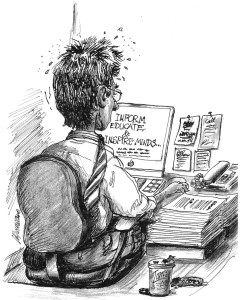Seeing really is believing
Mark Pavilons

There's truth to the phrase “seeing is believing.”
Hopefully we make our life decisions based on such first-hand facts.
However, the opposite tends to be true.
We often make choices or decisions based on what other people tell us. Depending on the source and its reliability, we judge whether or not to believe them.
But, I'm reminded of the sentiment “garbage in, garbage out.”
Think about it.
There's a very fundamental concept that drives human beings but it's a challenge. We need to know the difference between information and knowledge.
Do you?
We are currently at the height of access to information. There is literally nothing we can't uncover or discover about our planet and its inhabitants. From deep sea creatures to why clouds exist, there are a gazillion tidbits of information readily available for the curious in our midst. Teachers and students alike, are now equally armed, thanks to the Internet.
It sure makes helping the kids with their homework a lot easier!
But herein lies a dilemma. We're bombarded with information, facts, opinions and documents about this, that and the other. The sheer volume makes wading through the material a bit of a challenge. And, uncovering the bias becomes equally tough. We must consider the source of the information.
You likely won't find the most accurate information on nutrition from a junk food manufacturer. There's a ton of medical information available at our fingertips, but be careful to take advice from a website selling vitamins or weight loss miracles!
Information is open to interpretation, analysis, argument and debate.
So, then, what exactly is a “fact?”
Do we have to witness something in order for it to be true?
Well, the only real knowledge comes from personal experience. If we see something, touch it, feel it, smell it, taste it or hear it, it becomes part of our memory. It's real because we witnessed it first-hand. There is no dispute.
But do we have to see everything to believe it?
No, but it helps.
We have to place a lot of faith in others – scientists, physicians, researchers, engineers and architects – to help us make sound decisions based on the facts.
That's where it gets tricky. From personal experience, I know that people aren't always the best sources of information or knowledge. We're fraught with flaws, inherent bias, prejudice, emotion and a multitude of factors that make up who we are. All of this plays a role in deciphering incoming data.
And then we have to explain it to others. No wonder a lot gets lost in translation!
Fortunately, God gave us the tools to deal with it all – our glorious globs of grey matter.
We can journey into outer space, yet we still can't figure out what makes us tick. Our brains are as mysterious as life itself. But there are things we do know about – how we absorb, retain and process information and knowledge.
Our brains can produce upwards of one million chemicals that can combine to perform miracles. Commonly held estimates indicate our brains have 100 billion neurons and a quadrillion synapses.
Quite a gizmo we have there.
Our memory storage capacity is roughly 2.5 petabytes (a million gigabytes). That's like having a USB stick that can hold 3 million TV shows. In order to record that, your TV would have to run continuously for 300 years!
Some scientists believe that the potential to express “super-abilities” is a universal trait, but is obscured by our normal functioning intellect. In other words, we are capable of great things, but we let the everyday distractions, feelings, our environment, stress and life's inane aspects get in the way. Similar to “garbage in, garbage out.”
Because we're human, we can have the best information from the best people with the best of intentions, and still get it all wrong.
As I sat waiting for my daughter to finish her art class Sunday morning, my mind drifted. The sun shone on my face and the gentle breezes blew. I replayed memories of Caribbean trips with my wife and all those delicious sights, sounds and smells.
Anyone who's travelled knows that certain moist beach sand smell embedded in the carpets of hotel lobbies. It's unforgettable. It's likely mildew, but whenever I come across it these days, it takes me right back.
And still, there are things we can't explain.
What does “new” smell like? Can you describe the taste of a banana pepper without using the word “hot?” Explain love! What does fear feel like? Why do we laugh? What are dreams made of?
Our brains are like complicated recording devices, absorbing all forms of media every second of every day.
So yes, we are our own experts. The facts are all there buried in our brains. If only we could access them instantly and with crystal clarity.
Perhaps one day we can. Maybe in the future, we can come home after a day at work, plug our brains into our computers and download the day's experiences!
Until then, we have our work cut out for us. We have to absorb information and amass knowledge.
Good luck!
|
